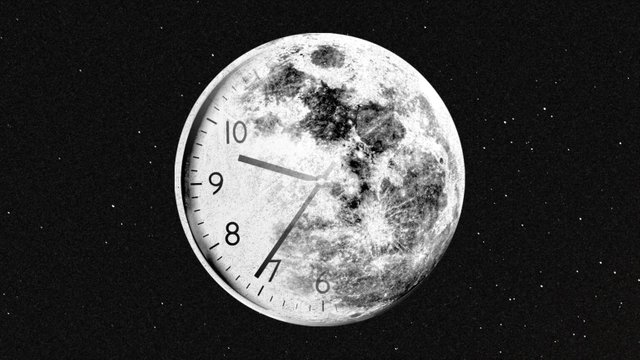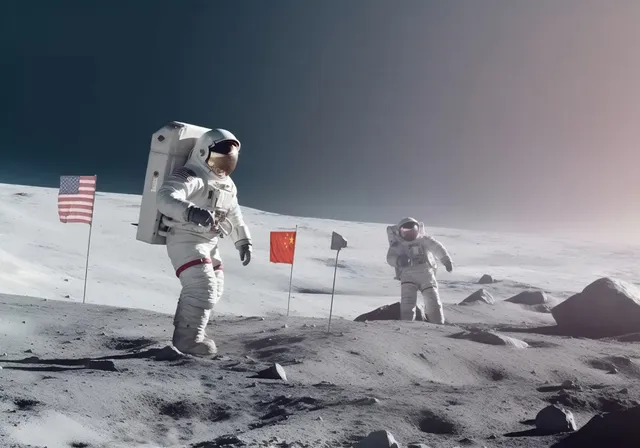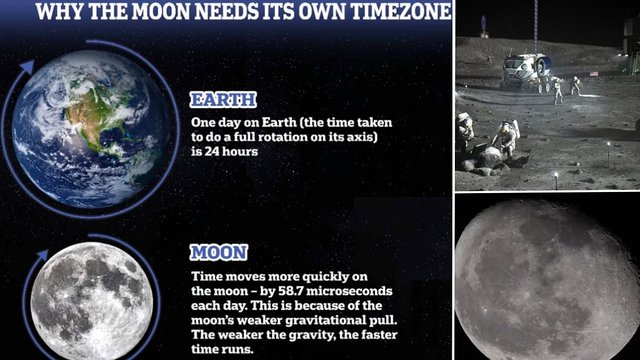The Moon will have 'official time'/La Luna tendrá 'hora oficial'

Source
In the 19th century, after the launch of the railway, our sense of time changed drastically. Before, trips lasted weeks, so we didn't care if we arrived at our destination at 5 in the afternoon or at 7 and each area had a local time but with the invention of the railway time and distances were considerably reduced.
En el siglo XIX tras la puesta en marcha del ferrocarril nuestro sentido del tiempo cambió drásticamente, antes los viajes duraban semanas por lo que nos daba igual llegar al destino a las 5 de la tarde que a las 7 y cada zona tenía un horario local, pero con la invención del ferrocarril el tiempo y las distancias se redujeron considerablemente.
All of this led, over the years, to the creation of a Coordinated Universal Time (UTC) unit to be able to coordinate arrivals and departures at the different stations and facilitate the receipt of goods and transfers. Now it seems that with the space race this UTC no longer makes sense, so it is necessary to create Coordinated Lunar Time.
Todo esto llevó, con los años, a la creación de una unidad de Tiempo Universal Coordinado (UTC) para poder coordinar las llegadas y salidas a las distintas estaciones y facilitar las recepciones de mercancías y los transbordos. Ahora parece que con la carrera espacial esta UTC ya deja de tener sentido por lo que se hace necesario crear Tiempo Lunar Coordinado.

Source
Although in the short term our first destination is the Moon, which, at the speed of light, is in our backyard and Earth's time could be used for everyday life, when we get to Mars this will no longer be of any use. Even on the Moon, if you want to carry out precision scientific experiments, you have to take into account relativistic effects.
Aunque a corto plazo nuestro primer destino sea la Luna que, a la velocidad de la luz, está en nuestro patio trasero y para la vida cotidiana se podría usar el tiempo de la Tierra, cuando lleguemos a Marte esto ya no servirá de nada. Incluso en la Luna si se quieren llevar a cabo experimentos científicos de precisión hay que tener en cuenta los efectos relativistas.
As Albert Einstein demonstrated, time does not pass at the same speed on Earth as on the Moon with a lag of 58.7 microseconds per day. This does not have a major problem when taking the bus, but it can affect the scientific experiments that are carried out on the Moon, which is why the US government has commissioned NASA to create a Coordinated Lunar Time (LTC), similar to the standards used on Earth.
Como Albert Einstein demostró, el tiempo no transcurre a la misma velocidad en la Tierra que en la Luna con un desfase de 58,7 microsegundos por día, esto para coger el autobús no tiene mayor problema pero si puede afectar a los experimentos científicos que se desarrollen en la Luna, por ello el gobierno de EEUU ha encargado a la NASA la creación de un Tiempo Lunar Coordinado (LTC), similar a los estándares utilizados en la Tierra.

Source
In principle, this coordinated lunar time would not be a typical time zone but the establishment of a complete time frame for the Moon that could, among other things, provide a reference point for the timing of lunar spacecraft and satellites that need a very high precision to be able to complete their missions.
En principio este tiempo lunar coordinado no se trataría de una zona horaria típica sino el establecimiento de un marco temporal completo para la Luna que podría, entre otras cosas, proporcionar un punto de referencia para el cronometraje de las naves espaciales y satélites lunares que necesitan una precisión muy alta para poder completar sus misiones.
NASA's plans are to have this time frame fully developed by the year 2026, which is when, predictably, we will set foot on the Moon again with the Artemis mission. And given that the Moon will most likely end up being a huge "spaceport" it seems more than reasonable to establish a time frame not only for the Moon but for the entire solar system.
Los planes de la NASA son tener este marco temporal totalmente desarrollado para el año 2026 que es cuando, previsiblemente, volveremos a poner el pie el la Luna con la misión Artemis. Y dado que lo más probable es que la Luna acabe siendo en enorme "espaciopuerto" parece más que razonable establecer un marco temporal no solo para la Luna sino para todo el sistema solar.
More information/Más información
https://www.reuters.com/science/white-house-directs-nasa-create-time-standard-moon-2024-04-02/#:~:text=The%20head%20of%20the%20White,Coordinated%20Lunar%20Time%20(LTC).
https://www.abc.es/ciencia/luna-hora-oficial-eeuu-ordena-nasa-crear-20240403111827-nt.html
Well I learn that NASA wants to go back to the Moon and that there is a new space race. Thanks for sharing. I will research more about it and more about the new LTC schedule that would be used in the future.
Thanks for your comment.
Albert Einstein sin lugar a dudas fue un científico fuera de serie y adelantado a su tiempo. Gracias a él es posible tener un visión distinta del espacio y del tiempo.
Gracias por compartir.
¡Saludos y éxitos!
Congratulations, your post has been upvoted by @dsc-r2cornell, which is the curating account for @R2cornell's Discord Community.